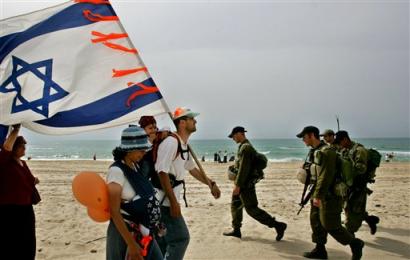|
Thousands protest Israel's Gaza pullout
(Agencies)
Updated: 2005-04-28 08:14
Tens of thousands of Israelis gathered Wednesday in the Gaza Strip's largest
settlement bloc to rally against the government's plan to withdraw from the
area, trying to maintain a carnival-like atmosphere of defiance despite a
Palestinian rocket attack.
Though the crowd filled the central lawn at Neve Dekalim, the largest Gush
Katif settlement, the turnout of about 40,000 was less than half the number the
settlers expected, and some residents dismissed the prediction that thousands of
the visitors would stay to join resistance to the pullout, set for July or
August.

Israeli soldiers on patrol walk past Israelis
as Jewish settlers and opponents of Israel's planned withdrawal from the
Gaza Strip march along the beach near the settlement of Nve Dekalim in the
Gush Katif bloc of settlements, southern Gaza Strip Wednesday April 27,
2005. Thousands of Jewish settlers and their supporters poured into the
area Wednesday to join a protest against Israeli Prime Minister Ariel
Sharon's plan to withdraw from the Gaza Strip and four West Bank
settlements this summer. The orange color has been adopted by the opposers
to Prime Minister Ariel Sharon's plan to pull out of the Gaza Strip.
[AP] | As the rally was in progress, a homemade Qassam rocket and two mortar shells
fired from a nearby Palestinian area exploded nearby, slightly wounding a
soldier. Though such attacks had diminished since a Feb. 8 cease-fire and
deployment of police by Palestinian leader Mahmoud Abbas, barrages have picked
up in recent days, and the Israeli military is warning of a general upsurge in
violence in Gaza.
Demonstrators at the Gaza settlement said the rocket attack showed that
Sharon's pullout plan would only encourage more violence. Sharon "is retreating
under fire and with his tail between his legs," said Benni Elon, a member of
parliament from a pro-settler party.
Despite Abbas' efforts to rein them in, the militants are likely to step up
attacks as the summer pullout approaches, trying to show that they are forcing
the Israelis to leave. Also, the Israeli military is warning that militant
groups in the West Bank are preparing a new round of violence for the fall,
after the pullout, to try to expel the Israelis.
Prime Minister Ariel Sharon's plan to evacuate all 21 settlements from Gaza
and four from the West Bank has the support of about two-thirds of his people,
according to polls. But the opposition, based on religion and ideology, is tough
and loud.
Adopting orange as the color of their protest, settlers and their backers
with orange flags, banners and T-shirts gathered on a warm, sunny day in Neve
Dekalim, a village of red-roofed houses with about 2,500 settlers next to Khan
Younis, a poverty-stricken Palestinian city of 100,000, with a squalid refugee
camp of 60,000 fenced off from the settlement.
Explaining his pullout plan, Sharon said maintaining 21 settlements with
8,500 residents among more than 1 million hostile and poverty-stricken
Palestinians in Gaza was an untenable proposition. Also, pulling out of the four
small settlements in the northern West Bank would solidify Israel's hold on main
settlement blocs where most of the 235,000 West Bank settlers live.
Though many of the settlers were strident in their denunciations of Sharon
and his policies, leaders insisted resistance would be nonviolent.
However, far-right member of parliament Arieh Eldad called for violent
resistance. "There must be resistance tat includes willingness to go to jail,"
he said.
Sara Lemann, from New Orleans, La., worried that the current pullout would
lead to evacuation of more West Bank settlements. "I think we all feel that we
could be next," she said. "I feel Jerusalem could be next."
Reuma Harari, who left the West Bank with her three children early in the
morning to attend the Gaza rally, seemed as bewildered as angry. "It's as if a
black hole were opening up," she said. "It imparts a sense of great
instability."
Avner Shimon, head of the Gaza regional council, said he expected the
visitors to leave after Passover.
"People are coming to enjoy themselves, see the place and hug us and to tell
us they are with us. I estimate that nobody will remain when it is over," he
told Israel Army Radio.
| |
 |
|
 |
|
|
Today's
Top News |
|
|
|
Top World
News |
 |
|
 |
|
|
|
|
|
|


